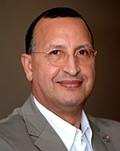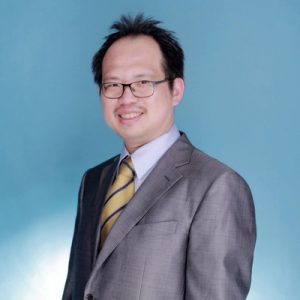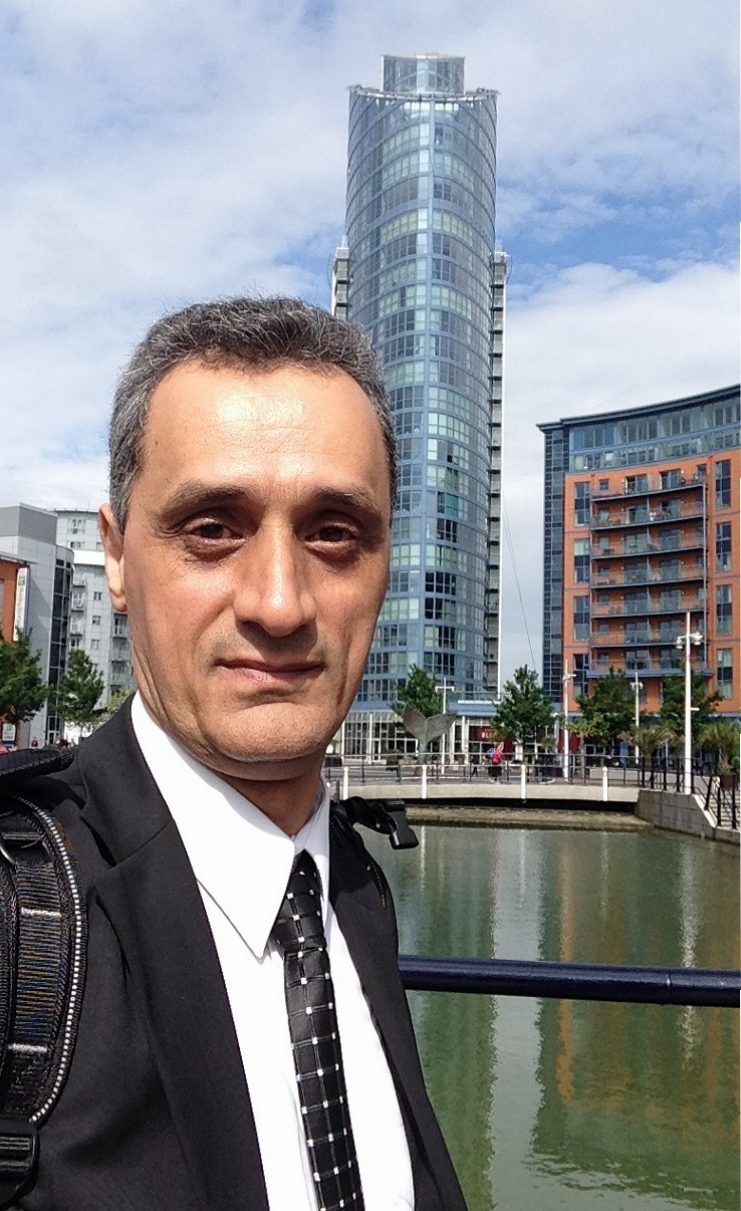The New IPv6-based Internet and its Impact on eSystems and Machine Learning
Prof. Latif Ladid
Founder & President of IPv6 Forum, www.ipv6forum.org
Founding Chair of 5G World Alliance, www.5gworldalliance.org
Chair, ETSI IPv6 Industry Specification Group, portal.etsi.org/tb.aspx
Chair, IEEE ComSoC IoT subcommittee, cms.comsoc.org/eprise/main/SiteGen/TC_IOT/Content/Home.html
Chair, IEEE ComSoC 5G subcommittee, cms.comsoc.org/eprise/main/SiteGen/TC_5GMWI/Content/Home.html
Vice Chair, IEEE ComSoC SDN-NFV subcommittee, cms.comsoc.org/eprise/main/SiteGen/TC_SDN_NFV/Content/Home.html
Emertius Trustee, Internet Society – ISOC, www.isoc.org
IPv6 Ready & Enabled Logos Program Board, www.ipv6ready.org
World Summit Award Board Member, www.wsis-award.com
Research Fellow @ University of Luxembourg on multiple European Commission Next Generation Technologies IST Projects
– Member of 3GPP PCG (Board), www.3gpp.org
– Member of 3GPP2 PCG, www.3gpp2.org
– Member of UN Strategy Council
– Member of Future Internet Forum EU Member States (representing Luxembourg)
Abstract: – The public IPv4 address space managed by IANA(http://www.iana.org) has been completely depleted back in Feb 1st 2011. This creates by itself a critical challenge when adding new systems and enabling machine learning services on the Internet. Without publicly routable IP addressing, the Internet of Systems, and anything that’s part of Machine Learning services on the Internet, would be greatly reduced in its capabilities and then limited in its potential success. Most discussions of IP over everything have been based on the illusionary assumption that the IP address space is an unlimited resource or it’s even taken for granted that IP is like oxygen produced for free by nature. The introduction of IPv6 provides enhanced features that were not tightly designed or scalable in IPv4 like IP mobility, end to end (e2e) connectivity, ad hoc services, etc. IPv6 will be addressing the extreme scenarios where IP becomes a commodity service. This new address platform will enable lower cost network deployment of large scale sensor networks, RFID, IP in the car, to any imaginable scenario where networking adds value to commodity.
IPv6 deployment is now in full swing with some countries achieving over 50% penetration such as Belgium. The US has some 80 Million users using IPv6 without even the users knowing it. Recently, Apple has required its apps developers to use IPv6 only for their apps starting from June 1st 2016, which is a great shot in the arm of IPv6. There are many inflections happening this decade to influence the design of the first tangible IoT, 5G and Smart Cities. It will be a combination of IoT, SDN-NFV, Cloud Computing, Edge Computing, Big IoT Data, and 5G, to sift through to realizing the paradigm shift from current research-based work to advanced IoT, 5G, and Smart Cities. This talk will be devoted to analyze the transformative societal impact of IPv6 on the potential mix of IPv6-based eSystems, Machine Learning, IoT, SDN-NFV, Cloud Computing, Big Data, and 5G and its advanced features, highlighting the challenges and the solutions moving forward.
Big Data and Intelligent Technologies – Does Industry 4.0 Call for Higher Education 4.0?
Dr. Fanny Klett, Director
German Workforce ADL Partnership Laboratory, Germany
Email: fanny.klett.de@adlnet.gov
Dr. Fanny Klett assumed the Directorship of the German Workforce Advanced Distributed Learning Partnership Laboratory, which is run in cooperation with the US Government, in 2009. Prior to this position, she has been with leading research institutions in principal positions. Fanny Klett is regularly invited as Visiting Professor and Distinguished Lecturer at universities worldwide. Her research addresses advanced solutions in the areas of information, data and content management, business intelligence, data mining, competency and performance management, and interoperability. Dr. Klett actively works in standardization bodies, such as IEEE Learning Technology Standards Committee, US Advanced Distributed Learning Initiative, and is CEN WS-LT LTSO expert. She chaired and served on more than 30 conference planning and program committees of UNESCO, IEEE, APSCE, among others. Fanny Klett is associated editor of IEEE publications, Member of the Advisory Board of the Knowledge Management and E-Learning International Journal as well as the Editorial Board of the Global Chinese Society for Computers in Education. In addition, she assists various industrial and governmental research sponsoring organizations worldwide, as an expert. Dr. Klett is IEEE Fellow.
Abstract:- Wireless and network technologies, the Internet of Things, the Internet of Everything, cloud computing, decision support systems and artificial intelligence are only few of the solutions toward products and services that are foreseen to become increasingly integrated into the industrial value chain addressing a recent trend toward Smart Factories of the future. This trend led to coining the term Industry 4.0, and despite many controversial views, it has initiated a broad discussion about a next industrial revolution. Also governments are more and more looking at intelligent technologies as enabler to solve the rising urbanization issues, make the cities smarter, and comfortable in the context of transport, climate, food, energy, health, and education, and contribute to a sustainable development. In view of this expansion of intelligent technologies, a need for a qualified and retaining competitive workforce has been established, and Higher Education organizations started to experience the force of the global economy, too, indicating recently an essential demand for strategic deployment of intelligent technologies in complex administrative, decision making, and quality control processes, to ensure the retention of students, among other goals.
Against this background, this talk addresses the questions increasingly raised in our Knowledge Economy: Are graduates prepared for industrial and market needs? Is Higher Education prepared to meet the demands of rapid technological transformations, such as Smart Cities, and Industry 4.0?
Taking into account the continuously growing amount of accessible data as well as the opportunity to combine data from various sources, manage and intelligently analyze the data, the talk is dedicated to an emerging area of research covering models and systems based on big data, business intelligence and analytics toward the establishment of a strong and smart linkage between academia, industry and government. It deals with ICT-enabled strategies to better align academia, industry and government by adhering to high market dynamics and social infrastructure, and to resolve many issues attributable to the fast changing conditions of the global employment market as well as the achievement of successful career development and beneficial workforce performance.
Recent development, challenges and recommendations from Internet of Things and Data Science
Dr. Victor Chang
Dr. Victor Chang is an Associate Professor in Information Management and Information Systems and also a Director of PhD Programme at International Business School Suzhou (IBSS), Xi’an Jiaotong Liverpool, China. Dr. Victor Chang was a Senior Lecturer in Computing at Leeds Beckett University, UK and a Visiting Researcher at the University of Southampton, UK. He has been a technical lead in web applications, web services, database, grid, cloud, storage/backup, bioinformatics, financial computing which subsequently have become his research interests. Victor has also successfully delivered many IT projects in Taiwan (place of birth), Singapore, Australia, and the UK since 1998. Victor is experienced in a number of different IT subjects and has 27 certifications with 97% on average. He completed PGCert (Higher Education, University Greenwich, 2012) and PhD (C.S, University of Southampton, 2013) within four years while working full-time, whereby the distance between his work and research is about hundreds of miles away. He has over 100 published peer-reviewed papers, including several high-quality journals up-to-date. Victor won £20,000 funding in 2001 (Singapore-Cambridge Trust) and £81,000 funding in 2009 (Department of Health). He was involved in part of the £6.5 million project in 2004, part of the £5.6 million project in 2006 and part of a £300,000 project in 2013. He also won another £200,000 to support his scholarly activities. He is a PI and Co-PI in some projects. Victor is a winner in 2011 European Identity Award in “On Premise to Cloud Migration”. He has won a prestigious European award, Best Project in Research, at the European Cloud and Identity Award in 2016. He was selected to present his research at the United Nations in 2003 and at the House of Commons, UK, in 2011. He won the best papers in 2012 and 2015. Dr Victor Chang has taught numerous undergraduate and postgraduate modules since Year 2011. In some modules he taught, students like his teaching and enjoy his labs and lectures.
Dr Victor Chang is leading expert on Cloud Computing, Big Data, Internet of Things and Security. He has demonstrated Storage as a Service, Health Informatics as a Service, Financial Software as a Service, Education as a Service, Big Data Processing as a Service, Integration as a Service, Security as a Service, Social Network as a Service, Data Visualization as a Service (Weather Science) and Consulting as a Service in Cloud Computing and Big Data services in both of his practitioner and academic experience. The contributions that he has offered will be published in high-quality journals. Additionally, his proposed frameworks have been adopted by several organisations. In April 2014 he received 5 certificates in a single international conference to set a record. Dr Victor Chang received 1 award and 4 certificates in one single international conference in May 2015 to set another record. He is the Founding Chair of international workshops in Emerging Software as a Service and Enterprise Security. His workshops have been described as the most successful workshops by conference organizers and have attracted audiences with positive response. As a result, he received an IEEE Outstanding Service Award in 2015.
One of his workshops has stepped up as an international conference on Internet of Things, Big Data and Security (IoTBDS) that has attracted high-profiled submissions and high-quality journals’ backing. He is also the founding chair for the international conference on Complexity, Future Information Systems and Risk (COMPLEXIS). He is an editor of the Cloud Computing adoption book with IGI Global. He is a reviewer of International Journal of Information Management (IJIM), Expert Systems with Applications, IEEE Transactions on Cloud Computing, IEEE Transactions on Services Computing, Journal of Internet Services and Applications and Journal of Computing and Information Technology. Dr Victor Chang is a joint Editor-in-Chief ofInternational Journal of Organizational and Collective Intelligence (IJOCI), and Open Journal of Big Data (OJBD). He has a leading journal, Business Intelligence as a Service in the Cloud” published in July 2014 by a highly prestigious journal, Future Generation Computer Systems (FGCS). He has been promoted as an Editor of FGCS since October 2014. He has the most popular article in a transaction world leading journal, called “Towards Achieving Data Security with the Cloud Computing Adoption Framework”. He is a guest editor for FGCS, IJIM, JNCA (J of Network and Computer Application) and ASOC (Applied Soft Computing) special issues. He welcomes submission of any high-quality papers to his journals. Some of his publications are available here.
New approach toward cybersecurity threads to industrial control systems: Self-Defending Control Systems as Generalisation of Adaptive Controllers
Dr. Majeed Soufian
Dr Majeed Soufian has a history of successful research collaboration alongside a commitment to teaching, development of young researchers and PhD students.
He graduated with a degree in applied physics with major in solid state (NUI), a MSc (UMIST) and PhD (MMU) in Intelligent Control Systems Engineering (Hard & Soft Computing Techniques for nonlinear modelling and control with industrial applications) and he has a MSc in Software Engineering (University of Oxford). His research collaborations include both academic, industrial and government agency partners. As a lecturer in Industrial Automation at Edinburgh Napier University, he is currently developing a collaboration on Industrial Control System Security (ICS2) and has secured funding for a PhD student to work in this field. He has published over 60 research articles in international conferences and journals with a research interest in industrial automation and its security, modelling, control engineering, robotics, vision, autonomous vehicle navigation, artificial intelligence, data mining and so on with applications ranging from industrial plastic extrusion to fermentation processes and from API (Active Pharmaceutical Ingredients) morphology to medical microbiology.
His reputation and network of international collaboration has led to his chairing of many special sessions at international conferences. His current commitments include a successful bid for a special session on “Industrial Automation and Process System’s Security” in the 26th IEEE international Symposium on Industrial Electronics ISIE’17, and he is now principle organiser and chairman for this special session. He is also a co-chairman for another two special sessions and three tracks at the IEEE-ISIE17 conference. He is in collaboration with iniLabs GmbH (a Swiss spin-off of the Institute of Neuroinformatics at the University of Zurich and the ETH Zurich), KAUST and Vienna University of Technology in developing and secured a new focused session for IEEE SENSORS 2017 conference, i.e.; “Sensors for Smart Living”. This includes topics such as sensor development for autonomous vehicle and assisted driving. He is also invited as Track Co-chair on “Application-Specific CE for Smart Cities” for 36th IEEE International Conference on Consumer Electronics (ICCE 2018) IEEE – ICCE 2018. He has reviewed articles for many scientific publications and sits on the International Editorial Review Board of Artificial Intelligence Research (AIR).Additionally, he has a long collaboration with the control section of Candu Energy Inc (part of SNC-Lavalin).
He holds a number of international patents which he exploited in the design and development of BiocypherÔ system software architecture for rapid typing and identification of pathogens. Furthermore in collaboration with Health Protection Agency (HPA), Clinical lab in MRI hospital, Manchester Medical Microbiology Partnership, a CV and MALDI-ToF-MS instrument manufacturers, he founded and was technical director of Claydon Bioinformatics Ltd. a spin-out company/SME for which he successfully secured a DTI SMART award for the same day identification of MRSA project with an estimated budget of over £1.1M. His industrial experience also includes establishing and managing an industrial R&D group for design and development of an electro optic sensor for semi-automatic navigation system of an autonomous mobile object and over four years in Numerical Algorithms Group where his expertise were utilised in the development and porting of numerical algorithms with some HPC (High Performance Computing) practices. Additionally he supervised an industrial project for the design and implementation of a multidimensional multivariable control system for an industrial web process after a thorough structural analysis to obtain its analytical model; was involved in the design of an intelligent system for navigation of a mobile robot and synthesised an intelligent controller for a MR Imaging field gradient system (hospital scanners). He also worked as a visiting scientist in STFC (Science and Technology Facility Council), Daresbury Laboratories toward a feasibility study of multi-scale (ranging from Angstrom to meter) modelling and developing a distributed system software for it.
Abstract:- Cybersecurity and vulnerability of industrial control systems has a direct link to instability of civilian critical infrastructures such as energy and water. Despite recent threads have highlighted existing associated risks, yet no general countermeasure has developed.
The control system design has dramatically evolved in the last half-century and numerous design strategies have emerged to deal with specific difficulties such nonlinearities, constraints, disturbances in both theory and application domain. For example, anti-windup PID controller was developed in response to input constraint, as gain scheduling was developed to deal with system nonlinearities. Furthermore, information about the process under control, its environments and their associated changes were used to tune the controller parameters accordingly and form adaptive control strategies. The undeniable success of these control design strategies owe to the knowledge provided to the controller in order to cope with undesired changes or disturbances. However, we are now face new challenges and threats due to connecting industrial control systems to the internet and leaving the vulnerable against any cyberattacks. It has widely been shown that firewall and network security cannot keep control system safe against cyber-threats even if they are responsible to control vital public infrastructures, nor any control design has yet developed to survive under such threats.
The aim of this talk is to propose an alternative but practical solution to basic key and common cyber-threats such as overloading (Flooding Attacks) and their associated risks to a typical industrial automation system. For this purpose, countermeasures that can directly be implemented in end-points regardless of any specific hardware or deployment platform are considered here. These proposed solutions include developing new control strategies that can defend associated industrial automation processes and themselves against such attacks, i.e., identifying and building a defence mechanism in control algorithm so they can adapt themselves and hence named self-defending control strategies. For demonstration an example of such control algorithms was developed and simulation results are presented.















